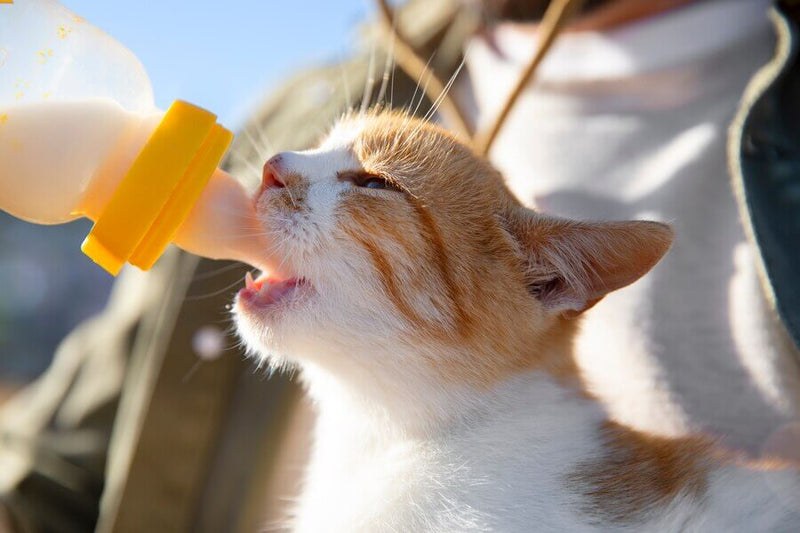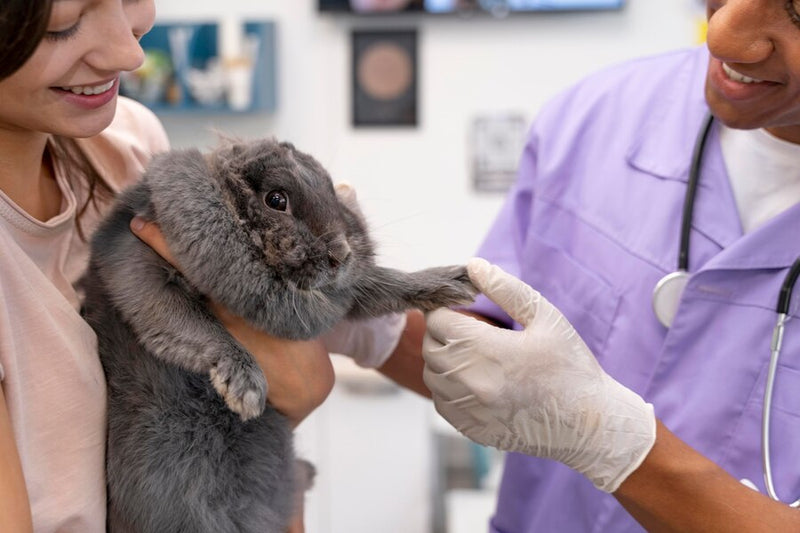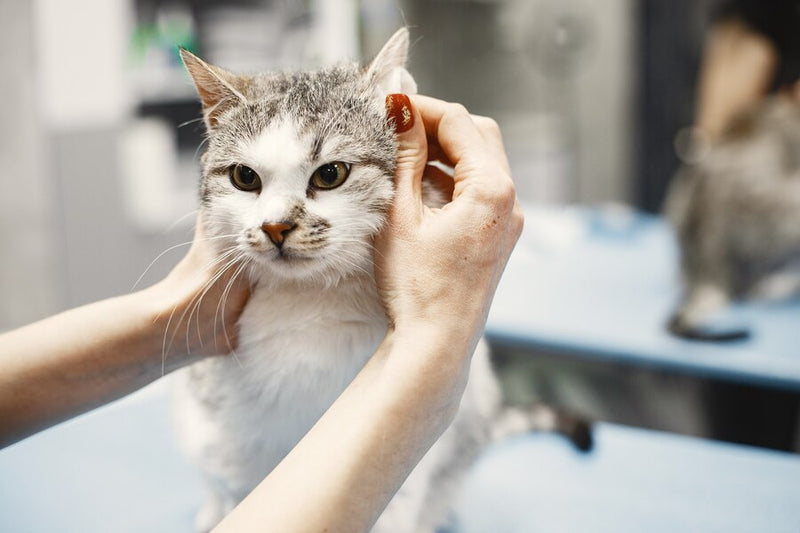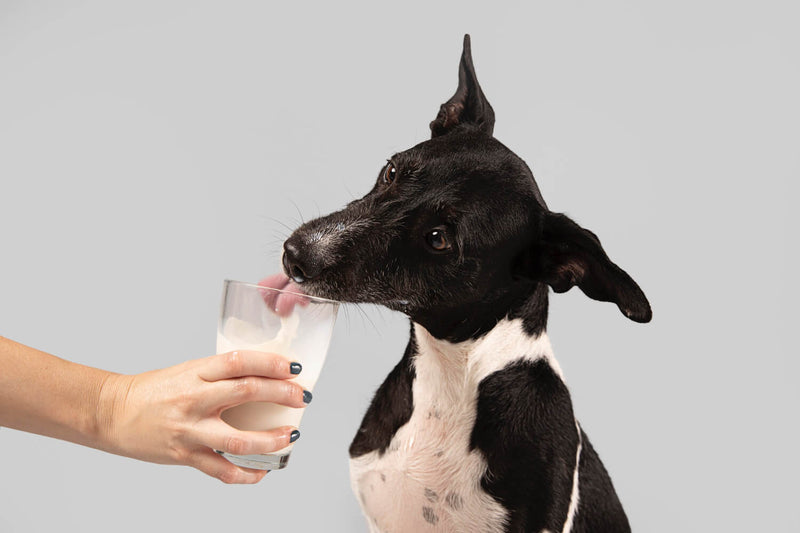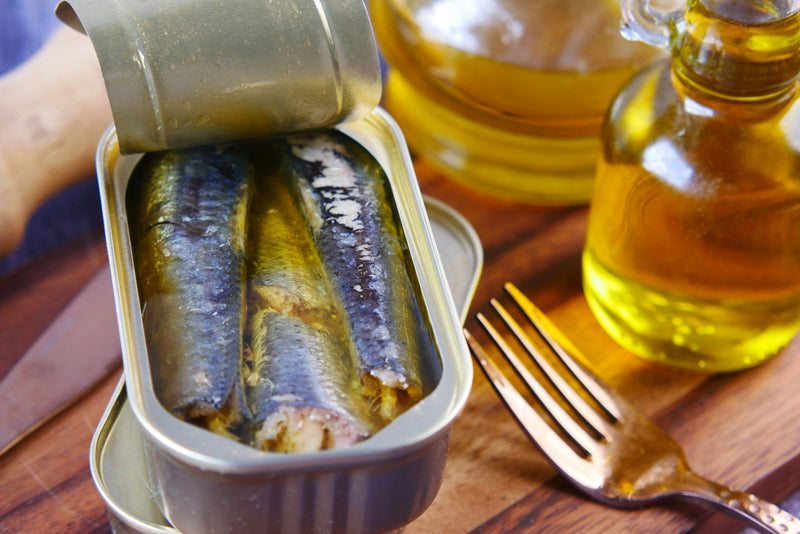
Welcome to Gritty Pet Co.
Your Canadian, specialty Pet Health & Wellness destination. 🇨🇦

Vet Reviewed & Approved
Dr. Ibrar A. is our veterinarian and a key member of our team. ✅
The right budgie food is crucial for their health and happiness. This guide will help you navigate the essentials of budgie nutrition with practical, straightforward advice. Whether you're new to budgie care or an experienced bird lover, we’ll cover everything from balancing seeds and pellets to adding fresh fruits and vegetables. Let's make feeding time easy and enjoyable for both you and your budgie.
Key Takeaways
Caring for your budgie's diet is essential for their health and happiness. Here are the top things you need to know:
What should your budgie eat daily? Ensure a balanced diet of high-quality seeds, fresh fruits, vegetables, and pellets for vital nutrients (1). 75-80% seeds/pellets and 20-25% fresh produce is ideal. This variety supports overall well-being and prevents nutritional gaps.
Avoid toxic foods. Keep your budgie safe by avoiding avocado, chocolate, alcohol, high-salt foods, caffeine, fruit pits, and onions (2). These can be toxic and severely harm their health. Always double-check new foods for safety before feeding.
Spot nutritional deficiencies early. Signs like feather plucking, lethargy, and breathing difficulties indicate deficiencies (3). Regular vet check-ups and a diverse diet ensure your budgie stays vibrant and healthy. Early detection and intervention are key to preventing long-term health issues.
Bonus Tips:
Provide Vitamin D . Ensure access to natural sunlight or full-spectrum lighting to aid in Vitamin D3 synthesis, crucial for calcium absorption and bone health. This prevents deficiencies and strengthens overall health. Budgies without access to natural light will benefit from a UVA/UVB bulb in their enclosure, which can be found at most pet supply stores that work with birds and reptiles.
Ensure adequate calcium. Calcium is vital for bone health, muscle function, and eggshell formation. Offer cuttlebone, mineral blocks, dark leafy greens, and crushed eggshells to maintain proper levels. To aid in absorption of calcium, ensure budgies have access to natural sunlight or a UVA/UVB light source.
Supplement with protein. Protein is essential for growth and feather quality. Include cooked eggs, legumes, and sprouted seeds to boost your budgie's protein intake.

A Balanced Diet for Budgies
Budgies, also called budgerigars, are small, long-tailed parrots known for their colorful feathers and cheerful chirping (4). Ensuring their health and happiness requires more than just a clean cage and toys. A vital aspect of budgie care is providing them with a nutritious and well-balanced diet. In this post, we'll explore everything you need to know about budgie food.
Ensuring a balanced diet for budgies involves incorporating a variety of essential food components.
Vitamin A :Vitamin A plays a crucial role in maintaining budgies' health by promoting digestion and boosts immunity. It’s deficiency can cause scaly feet, faded feathers, and respiratory issues.
Vitamin B (B6, B9, B12) : B vitamins, including B6, B9, and B12, are essential for budgies as they support proper digestion and energy metabolism (5). B vitamins are crucial during periods of high activity like mating or nurturing chicks.
Vitamin D3 : Vitamin D3 is essential for budgies as it aids in calcium absorption for bone and beak health. It’s deficiency leads to issues like low egg production, soft shells, flaky beaks, and weakened bones.
Vitamin E : Vitamin E plays a vital role in bolstering budgies' immune systems and helping them combat stress effectively. It’s deficiency may result in muscle weakness and impaired vision.
Calcium : Calcium is critical for budgies as it is essential for bone and beak structure, as well as mood regulation. It’s deficiency can lead to anxiety and weakened bones.
Protein : Protein serves as the building blocks of muscles and tissues in budgies, playing a crucial role in maintaining their physical health and vitality. Lack of protein in their diet can lead to reduced muscle tone and strength, impacting their ability to fly and engage in physical activities. Variety in protein sources ensures all necessary amino acids are obtained.
Budgie Food Nutrient Needs
A balanced diet is essential for your budgie's health and vitality. It should include a variety of foods to ensure they receive all the necessary nutrients. A good base for their diet is high-quality budgie seed mix. Seeds form the basis, offering fats, proteins, and carbohydrates.
In addition to seeds, fresh fruits and vegetables should make up a significant portion of your budgie's diet. Offer a variety of options such as leafy greens, carrots, broccoli, apples, and berries. Additionally, pellets serve as a concentrated source of nutrients, including proteins and vitamins, ensuring dietary completeness.
By combining seeds, fruits, vegetables, and pellets, budgie owners can provide their feathered companions with a nutritionally diverse and balanced diet essential for optimal health and vitality. Variety not only meets their nutritional requirements but also promotes natural foraging behaviours and keeps mealtime stimulating and enjoyable for the birds.
Foods That Should Never Enter Your Budgie's Diet
There are certain foods that should never be included in a budgie's diet due to their potential harm to the bird's health. It's essential to be aware of these foods to ensure the well-being and longevity of your feathered companion:
Avocado
Chocolate
Alcohol
High-salt foods
Caffeinated beverages
Fruit pits and seeds containing cyanide
Onions and garlic
Junk food and sugary treats
Safe Foods for Budgies
Seeds : Rich in healthy fats and essential nutrients for energy and overall health.
Pellets: Formulated to provide a balanced mix of essential nutrients, vitamins, and minerals.
Fresh Vegetables : Excellent sources of vitamins, minerals, and antioxidants for overall health.
Leafy Greens : Rich in vitamins and minerals, supporting immune function and bone health.
Carrots : Excellent source of beta-carotene for healthy vision and skin.
Broccoli : Provides vitamins, minerals, and antioxidants supporting immune function.
Bell Peppers : Rich in vitamin C and antioxidants, supporting immune function.
Apples : Contains fibre and vitamin C, promoting digestive health and immune function.
Berries : Rich in antioxidants, vitamins, and fibre, supporting immune function.
Cooked Eggs : Excellent source of high-quality protein and essential vitamins for overall health.
Feeding Routine for Budgies
Feeding routine for budgies should ideally mirror their natural behavior observed in the wild. In their natural habitat, budgies typically forage for food at daybreak, engage in various activities throughout the day such as preening and playing, and then feed again in the late afternoon before returning to roost for the night.
Hence, many budgie owners opt for feeding their feathered companions twice a day, once in the morning and once in the evening, using food as training aids or rewards in between these main meals. However, some may choose to leave food available throughout the day, which can also be suitable for budgies capable of self-regulating their intake and not prone to constant grazing.
If able, provide budgies with interactive feeding toys and puzzles to stimulate their natural foraging instincts and help them stay fit, mentally as well as physically.
Nutritional Deficiencies: Signs, solutions, vet consults
Nutritional deficiencies pose significant risks to the health and well-being of budgies, requiring careful attention to their diet and overall care. Common deficiencies budgies may face include insufficient intake of vitamin A, calcium, vitamin D, protein, iodine, and iron. Each of these nutrients plays a vital role in various aspects of a budgie's health, from feather quality to bone strength and reproductive health.
Signs of nutritional deficiencies in budgies manifest in various ways.
Feather Problems : Including feather plucking, dullness, or abnormal molting.
Eye Problems : Such as swelling, discharge, or cloudiness.
Lethargy : Decreased activity levels or weakness.
Breathing Difficulties : Wheezing or laboured breathing.
Bone Abnormalities : Including deformities or fractures.
Egg Binding : Difficulty laying eggs, a sign of calcium deficiency in breeding females.
Consult a veterinarian if you notice any signs of nutritional deficiencies or if you're unsure about your budgie's diet. A vet can provide tailored advice, recommend appropriate supplements, and conduct tests if necessary to diagnose and treat any underlying health issues. Regular check-ups are crucial for maintaining your budgie's health and preventing nutritional deficiencies.
Diet Transitions
Transitioning a budgie's diet from seeds to pellets and introducing fresh foods can be a gradual process to ensure acceptance and nutritional balance. Begin by gradually mixing a small amount of pellets into the seed mix, increasing the proportion of pellets over several weeks as the budgie becomes accustomed to the new food.
As the budgie becomes more comfortable with pellets and fresh foods, gradually reduce the amount of seed in their diet until it's eventually replaced with pellets and fresh foods. Monitor their eating habits and adjust the diet as needed to ensure they're receiving a balanced and nutritious diet.

Advanced Dietary Tips for Budgies
It's crucial to provide a high-quality diet that offers a balanced blend of seeds, pellets, fresh fruits, and vegetables. Offer a diverse range of foods to ensure adequate intake of vitamins and minerals. Regular monitoring, veterinary care, and adjustments to the diet as needed are essential for maintaining optimal health and overall well-being.
Offer vitamin and mineral supplements if needed. Supplementation may be necessary in some cases, but it's essential to administer them cautiously to avoid overdosing.
Provide access to natural sunlight or full-spectrum lighting to aid in vitamin D absorption. This also facilitates calcium absorption and bone health.
Ensure adequate calcium intake, which is crucial for bone health, muscle function, and eggshell formation, especially for breeding females. Good calcium sources include cuttlebone, mineral blocks, dark leafy greens, sesame seeds, or crushed eggshells.
Ensure a balanced intake of iodine to prevent deficiencies or excesses. Incorporate iodine-rich foods like seaweed or iodine supplements recommended by your vet.
Supplement the diet with protein-rich foods such as cooked eggs (scrambled or boiled), legumes (cooked beans, lentils), and sprouted seeds. Protein is essential for growth, muscle development, and feather quality.
Ensure fresh, clean water is available at all times. Change the water daily to prevent contamination and encourage hydration.
Pay attention to how much your budgie eats and adjust portion sizes accordingly. Budgies can be prone to obesity if overfed.
Incorporate natural foraging activities by using interactive feeding toys or puzzles, varying food presentation in different areas of the cage, and creating homemade foraging opportunities with safe materials to stimulate mental and physical activity.
Product Recommends
FAQ
1. What Should I Feed My Budgie Daily?
A budgie's daily diet should include a mix of high-quality seeds or pellets (75-80%), supplemented with fresh fruits and vegetables. Offer foods like leafy greens, carrots, and apples, along with a calcium source like cuttlebone for overall health.
2. What Foods Are Harmful To Budgies?
Avoid feeding budgies avocado, chocolate, caffeine, alcohol, high-salt foods, and fruit pits or seeds containing cyanide, such as apple seeds and cherry pits. These can be toxic and harmful to their health .
3. How Often Should I Feed My Budgie?
Budgies should be fed twice a day, once in the morning and once in the evening. Fresh fruits and vegetables should be removed after a few hours to prevent spoilage, while seeds or pellets can be left available for nibbling throughout the day.
4. What Are The Signs Of Nutritional Deficiencies In Budgies?
Watch for signs like feather plucking, dull feathers, lethargy, and breathing difficulties. These can indicate nutritional deficiencies. Regular vet check-ups and a balanced diet with variety are crucial to prevent these issues.
5. Can Budgies Eat Nuts And Seeds?
Yes, budgies can eat a variety of seeds such as millet, sunflower, and flax seeds in moderation. They can also enjoy nuts like walnuts and almonds, but these should be unsalted and given in small amounts to avoid excess fat intake.
Top 3 YouTube Videos on What to Feed you Fish
1. What Should You Feed Your Bird? | My Parrots’ Complete Diet
Why Watch : Learn the essentials of creating a balanced diet for your budgie, emphasizing the importance of variety and proper nutrition.
2. Budgies Food - Best Budgie Food List
Why Watch : Discover the best foods to include in your budgie's diet and practical tips on how to prepare and serve them.
3. How to Feed Budgies | Choosing the Right Foods
Why Watch : Learn about the different food options for budgies, including safe and unsafe foods.
Final Thoughts
Providing a well-rounded and nutritious diet is essential for the health and well-being of budgies. By incorporating a variety of high-quality seeds, pellets, fresh fruits, and vegetables into their daily meals, budgie owners can ensure their feathered companions receive essential vitamins, minerals, and nutrients.
References
- 1. Reid, R. B., & Perlberg, W. (1998). Emerging trends in pet bird diets. JOURNAL-AMERICAN VETERINARY MEDICAL ASSOCIATION, 212, 1236-1237.
- 2. Blake, S. (2015). Food Intolerance. FriesenPress.
- 3. Schulte, M. S., & Rupley, A. E. (2004). Avian care and husbandry. Veterinary Clinics: Exotic Animal Practice, 7(2), 315-350.
- 4. Tp, a. D., & vk, r. M. K. A study on ecology and behaviour of budgerigar (melopsittacus undulatus) under captivity at edavanna, malappuram district, kerala.
- 5. I El-Kady, R., G Sallam, M., N Kamel, N., Samy, A., A Elghamry, A. E. K., E Abusinaa, G., & Khalifa, W. H. (2024). Effect of in ovo feeding of different level of vitamin B complex (B1, B2 and B12) on Hatchability, Production Performance, Carcass Characteristic, Blood Biochemical and Muscle Antioxidant of Broiler Chickens. Egyptian Journal of Veterinary Sciences, 55(2), 507-516.




